|
|
|
Sort Order |
|
|
|
Items / Page
|
|
|
|
|
|
|
| Srl | Item |
| 1 |
ID:
175533
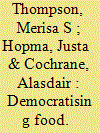

|
|
|
|
|
| Summary/Abstract |
Prevailing political and ethical approaches that have been used to both critique and propose alternatives to the existing food system are lacking. Although food security, food sovereignty, food justice, and food democracy all offer something important to our reflection on the global food system, none is adequate as an alternative to the status quo. This article analyses each in order to identify the prerequisites for such an alternative approach to food governance. These include a focus on goods like nutrition and health, equitable distribution, supporting livelihoods, environmental sustainability, and social justice. However, other goods, like the interests of non-human animals, are not presently represented. Moreover, incorporating all of these goods is incredibly demanding, and some are in tension. This raises the question of how each can be appropriately accommodated and balanced. The article proposes that this ought to be done through deliberative democratic processes that incorporate the interests of all relevant parties at the local, national, regional, and global levels. In other words, the article calls for a deliberative approach to the democratisation of food. It also proposes that one promising potential for incorporating the interests of all affected parties and addressing power imbalances lies in organising the scope and remit of deliberation around food type.
|
|
|
|
|
|
|
|
|
|
|
|
|
|
|
|
| 2 |
ID:
186005


|
|
|
|
|
| Summary/Abstract |
This article examines governments' responses to food crises and famines in the nondemocratic world. After the sudden collapse of the Soviet Union, many of the remaining communist countries encountered an unprecedented level of food shortage and economic hardship, which, in turn, expedited or led to regime collapse. However, Cuba and North Korea are striking cases that have managed to survive the extreme situations from the 1990s onward. In this comparative-historical research, I argue that although the two countries implemented different coping strategies in light of domestic food distribution and international aid inducement, similar outcomes are observed in terms of regime survival. Despite the varied strategies, the state-mandated food politics were commonly mobilized through public rationing in these countries during the Cold War. This pre-crisis statecraft effectively disempowered the people, leaving them with a strong dependency on the state food systems and a weak voice of complaint against their governments.
|
|
|
|
|
|
|
|
|
|
|
|
|
|
|
|
| 3 |
ID:
149595


|
|
|
|
|
| Summary/Abstract |
Hong Kong, a part of China, yet separated from it by a borderline and a different social system, relies mostly on China for its fresh food. With a high incidence of food contamination, many Hong Kong people have turned to a new food alternative – locally grown organic vegetables. The number of organic growers has risen significantly over the past decade. This paper examines the emergence of local organic food production in Hong Kong since the turn of the century. Not only is this revival of an interest in agricultural production (manifested in the increase in organic farms and organic food consumers that is related to the global movement of eco-agriculture), it is also intertwined with a public discourse relating to land preservation, the balance between an agricultural economy and urban development and food localism. Continuous food news revealing the scale of substandard and poisonous food produced in China have escalated the scare surrounding unsafe food and has helped turn consumers to local produce and to build the discourses on food localism. The paper argues that such a local food consciousness has been fed by the local politics of resistance against negative influences from China in the evolving cross-border relations between China and Hong Kong.
|
|
|
|
|
|
|
|
|
|
|
|
|
|
|
|
| 4 |
ID:
146879
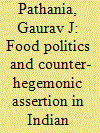

|
|
|
|
|
| Summary/Abstract |
Recently, heated debates concerning food politics have erupted at some of the most prestigious institutes of higher education in India. Students demand inclusion of beef and other meat in their hostel food menu, claiming hostel canteens represent only ‘mainstream’ Hindu culture. To boycott this culture and instil consciousness of their cosmopolitan life-world, they organise campus ‘Beef Festivals’ and publicly idolise so-called ‘demons’ of Hindu mythology. Using a Gramscian framework, this article explores the activism of marginalised students as counter-hegemonic and critically examines the ideological standpoints involved. As university spaces become significant sites to reinvent caste identities, we see that in their counter-hegemonic struggles, marginalised students employ the same tools and symbols of meat and myth as their opponents. It is argued that this strategy ultimately risks contradicting the goal of their activism and may block broader visions of an equal and just society.
|
|
|
|
|
|
|
|
|
|
|
|
|
|
|
|
| 5 |
ID:
133109
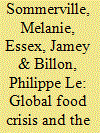

|
|
|
|
|
| Publication |
2014.
|
| Summary/Abstract |
Growing anxieties over food security have recently brought sharp geopolitical overtones to debates about the agro-food sector. Contending that this 'geopolitical moment' highlights the mutually constitutive nature of geopolitics and political economies of food, we examine how dominant geopolitical framings of food security extend and deepen neoliberal models of agro-food provisioning, and highlight the need for further attention to these dynamics from political geographers. We develop a preliminary research agenda for further work in the field, focusing on the recent spate of global farmland acquisitions, questions of agro-food governance, the securitisation of hunger and obesity, and the environmental impacts of dominant agro-food systems. Throughout, we highlight the value of a counter-geopolitics of food security for re-situating agro-food politics outside hegemonic policies and institutions, and of the alter-geopolitics of food pursued by communities embodying concrete alternative food production and consumption systems.
|
|
|
|
|
|
|
|
|
|
|
|
|
|
|
|
| 6 |
ID:
162618
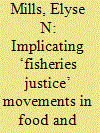

|
|
|
|
|
| Summary/Abstract |
While much debate on climate change has emerged around food, forest and land politics, the fisheries sector has only recently become more visibly implicated in these discussions. Similarly, in comparison to food and agrarian movements, fishers’ resistance to intensified mitigation efforts and resource exclusion is still significantly understudied academically, and receives little attention in political spheres. This highlights a critical gap in both food and climate politics literature, which this paper aims to present a framework for addressing. To do so, it contextualises the emergence of overlapping processes of exclusion in global fisheries, and explores the implications global food system transformations have had in the fisheries sector, and the reactions this has spurred from South African fishers. It then traces the convergence of fishers’ movements with other resource justice movements, and how this has contributed to the rise of ‘fisheries justice’. Finally, it presents four interlinked propositions – highlighting food sovereignty, resource access and conflict, climate change and mitigation, convergences between movements, and alternatives proposed by fishers – as a framework for how incorporating fisheries and fishers’ movements can broaden our understanding of transnational social movements, and expand the depth and scope of food and climate politics.
|
|
|
|
|
|
|
|
|
|
|
|
|
|
|
|
| 7 |
ID:
172428
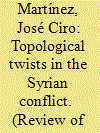

|
|
|
|
|
| Summary/Abstract |
This article seeks to question the epistemological monopoly of territory and scale in analyses of the Syrian conflict. It does so to both challenge static conceptualisations of space in the study of politics and analyse how seemingly remote actors influence wartime outcomes. Since 2011, NGOs, government bodies, and merchants have worked to connect Damascus to Tehran, Idlib to Istanbul, London to Dara‘a. These connections have proven crucial to the reliable supply of food, funds, and firepower. Yet rather than reveal the importance of foreign patrons or proxies on the ground, such dynamics speak to a world in which relationships matter more than distance, practices more than geopolitical position or a priori forms of alliance. Drawing on the work of John Allen, I suggest why thinking topologically about these dynamics better equips us to understand the political outcomes they help engender. To demonstrate the promise of this approach, I hone in on the partnerships, intermediaries, and connections that shape performances of political authority in Syria by examining one object crucial to its enactment: bread.
|
|
|
|
|
|
|
|
|
|
|
|
|
|
|
|
|
|
|
|
|